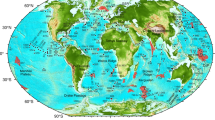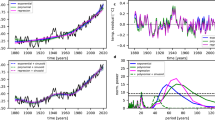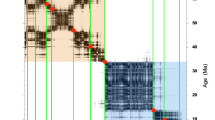Abstract
AMONG recent papers supporting the astronomical theory of climatic change1–5, the work of Hays et al.5 is of particular importance in providing detailed quasi-periods from deep-sea cores. I wish to draw attention here to the fact that the periods found are very close to the periods predicted by Berger6,7 in the latest and most accurate calculation of the variations of the various ‘Milankovitch’ parameters. The roughly 24,000- and 19,500-yr periods from the core samples are not significantly different from the periods associated with the largest amplitude terms in the series expansion of the precessional parameter e sin ω the periods around 42,000 yr are essentially identical with the most important term in the expansion of the obliquity ε and the peaks in the range of 106,000 yr containing most of the variance, might be regarded as either a contribution from the eccentricity, where a weighted mean of the main amplitude terms has a period of 110,753 yr, or as a beat effect of precessional periods, as has been noted by Wigley8.
This is a preview of subscription content, access via your institution
Access options
Subscribe to this journal
Receive 51 print issues and online access
$199.00 per year
only $3.90 per issue
Buy this article
- Purchase on SpringerLink
- Instant access to full article PDF
Prices may be subject to local taxes which are calculated during checkout
Similar content being viewed by others
References
Kukla, G. J. Nature 253, 600–603 (1975).
Weertman, J. Nature 261, 17–20 (1976).
Suarez, M. J. & Held, I. M. Nature 263, 46–47 (1976).
Johnson, R. G. & McClure, B. T. Quat. Res. 6, 325–355 (1976).
Hays, J. D., Imbrie, J. & Shackleton, N. J. Science 194, 1121–1132 (1976).
Berger, A. Celestial Mech. 15, 53–74 (1977).
Berger, A. Astron. Astrophys. 51, 127–135 (1976).
Wigley, T. M. L. Nature 264, 629–631 (1976).
Croll, J. Theory Secular Changes of the Earth Climate (Appleton. New York. 1875).
Milankovitch, M. Konigl. Serb. Akad. Beograd Spec. Publ. 132 (1941) (translated by the Israel Program for Scientific Translations, Jerusalem. 1969).
Mitchell, J. M. Jr., Quat. Res. 6, 481–493 (1976).
Broecker, W. S. & van Donk, J. Rev. Geophvs. Space Phys. 8, 169–198 (1970).
Berger, A. Palaeogeogr. Palaeoclimatol. Palaeoecol. 21, 227–235 (1977).
Gates, W. L. Science 191, 1138–1144 (1976).
Berger, A. in WMO/IAMAP Symposium on Long-Term Climatic Fluctuations, WMO 421, 65–72 (1975).
Broecker, W. S. Meteorological Monograph 8, 139–141 (1968).
Berger, A. Ann. Soc. scient. Bruxelles 89, 69–91 (1975).
Bernard, E. Acad. R. Sciences Outre-Mer. Sciences Naturelles Méd., nouv. Sér. 12 1 (1962).
Berger, A. EOS Traits. Am. Geophys. Union 57, 254 (1976).
Author information
Authors and Affiliations
Rights and permissions
About this article
Cite this article
BERGER, A. Support for the astronomical theory of climatic change. Nature 269, 44–45 (1977). https://doi.org/10.1038/269044a0
Received:
Accepted:
Issue date:
DOI: https://doi.org/10.1038/269044a0
This article is cited by
-
Early Jurassic extrinsic solar system dynamics versus intrinsic Earth processes: Toarcian sedimentation and benthic life in deep-sea contourite drift facies, Cardigan Bay Basin, UK
Progress in Earth and Planetary Science (2024)
-
Facies and depositional environments of the Upper Muschelkalk (Schinznach Formation, Middle Triassic) in northern Switzerland
Swiss Journal of Geosciences (2019)
-
Incidence of obliquity and precession-forced Milankovitch cycles in the western Mediterranean: early Messinian sedimentation in the Sorbas Basin (Almería, southern Spain)
International Journal of Earth Sciences (2013)
-
Making sense of palaeoclimate sensitivity
Nature (2012)
-
Planktonic versus benthic foraminifera response to Milankovitch forcing (Late Jurassic, Betic Cordillera): testing methods for cyclostratigraphic analysis
Facies (2010)



